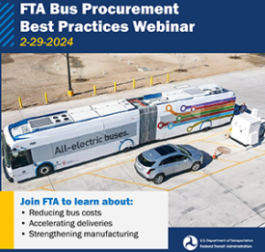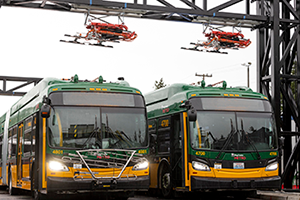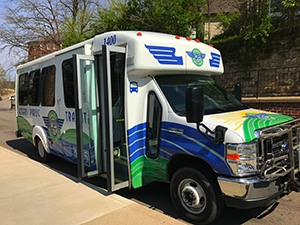Bus Procurement
The Infrastructure Investment and Jobs Act of 2021 greatly increased federal support to modernize and expand public transportation nationwide, including investments in the nation’s bus systems. FTA will administer $5.1 billion in formula and competitive grants through the Buses and Bus Facilities Program and an additional $5.6 billion in Low or No Emission Bus Grants through 2026.
Among other programs, the federal funding will support the purchase of modern American-made transit buses and upgrade fueling and maintenance infrastructure.

Supporting American Bus Manufacturing
FTA is focused on the health of the American bus manufacturing industry. More than 1,000 private companies supply this sector, providing everything from parts to systems to entire vehicles.
Despite a historic level of federal investment, transit-related businesses – and, especially, vehicle manufacturers – are facing significant challenges.
For companies that manufacture buses, high levels of customization, inflated component costs, and long procurement and payment timelines are impacting their financial health.

Those challenges are undercutting federal investments, threatening the financial solvency of some manufacturers, leading others to close their U.S. manufacturing facilities, and jeopardizing the ability of transit agencies to procure buses. These factors have led to a major backlog of bus orders, which in turn slows agencies’ service improvement plans.
FTA is working with the American Public Transportation Association (APTA), the Community Transportation Association of America (CTAA), bus manufacturers, transit agencies, and other stakeholders to identify solutions and support actions to help contain vehicle costs, accelerate delivery of modern buses, and strengthen the American bus manufacturing industry. Thus far, FTA has:

- significantly expanded technical assistance throughout the transit industry, including bus manufacturers and transit operators
- recommended best practices and provided incentives to transit agencies to reconsider customization decisions that add unnecessary engineering costs, extend procurement cycles, and eliminate the efficiency in scaled production
- added new priority considerations in the Notice of Funding Opportunity for the Low or No Emission Grant Program and the Grants for Buses and Bus Facilities Competitive Program
In February 2024, FTA issued a Dear Colleague letter highlighting tools to improve bus procurement and manufacturing.
FTA also hosted a webinar to highlight solutions to get the most from federal investments, including recommended procurement tools, steps to reduce bus costs, shorten production timelines, and help maintain domestic manufacturing capacity.
- Watch the recording
- View the presentation
Procurement Considerations
Flexibilities available to federal grant recipients to help accelerate procurement cycles, reduce bus costs and risk of cost increases, and encourage more competition and innovation to the U.S. bus manufacturing industry include:
| Accelerate Procurements | Lower Bus Costs and Promote Competition |
|---|---|
|
|
Bus Procurement Resources
- OMB Uniform Administrative Requirements, Cost Principles, and Audit Requirements for Federal Awards [2 CFR § 200.318]
- Third Party Procurement Guidance
- Best Practices Procurement Manual
- Guidance in Response to Cost and Payment Questions
- Bus Procurement FAQs
- Transit Vehicle Manufacturer Civil Rights/ADA Requirements
- Eligible Transit Vehicle Manufacturers
